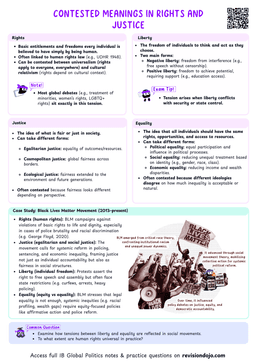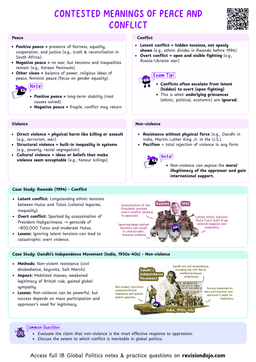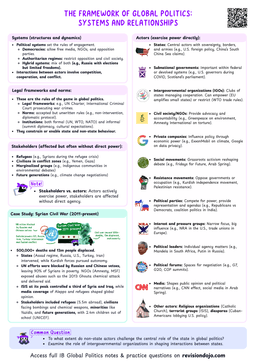Understanding State Sovereignty
- State sovereignty is a foundational concept in international relations, referring to the authority of a state to govern itself without external interference. It encompasses two main dimensions:
- Internal sovereignty: The state's authority over its territory and population.
- External sovereignty: The state's recognition as an independent entity by other states.
- The concept of sovereignty originated from the 1648 Peace of Westphalia, which established the principles of territorial integrity and non-interference in domestic affairs.
Traditional Notions of Sovereignty
- Absolute Authority: States have complete control over their internal affairs, including lawmaking, enforcement, and governance.
- Territorial Integrity: Borders are inviolable, and no external actor can intervene without consent.
- Non-Interference: Other states and international organizations must respect a state's domestic jurisdiction.
- The Westphalian model is evident in the United Nations Charter, which emphasizes the principles of sovereign equality and non-interference in Article 2(1) and 2(7).
Modern Notions of Sovereignty
- Conditional Sovereignty: The rise of humanitarian intervention and the Responsibility to Protect (R2P) doctrine has challenged the idea of absolute non-interference.
- States may lose some sovereignty if they fail to protect their populations from mass atrocities.
- Shared Sovereignty: Globalization and regional integration have led to the sharing of sovereignty in areas like trade, security, and environmental policy.
- The European Union is a prime example, where member states pool sovereignty for collective decision-making.
- Digital Sovereignty: The digital age has introduced new dimensions of sovereignty, such as control over cyberspace and data governance.
- States now assert sovereignty over digital infrastructure and online activities.
- Modern sovereignty reflects a balance between traditional state authority and the need for international cooperation and accountability.
Tensions Between Traditional and Modern Sovereignty
- Human Rights vs. Non-Interference: The global emphasis on human rights often clashes with the principle of non-interference.
- Examples include international responses to crises in Syria and Myanmar.
- Globalization and Economic Interdependence: States must navigate the tension between maintaining economic sovereignty and participating in global markets.
- Transnational Challenges: Issues like climate change, terrorism, and pandemics require collective action, challenging the notion of absolute sovereignty.
- European Union: The EU represents a unique model of shared sovereignty, where member states cede certain powers to supranational institutions.
- China's Digital Sovereignty: China emphasizes control over its digital space through policies like the Great Firewall, reflecting a modern interpretation of sovereignty.
- R2P in Libya (2011): The NATO intervention in Libya under the R2P framework highlighted the tension between humanitarian intervention and state sovereignty.
- The 2015 Paris Climate Agreement illustrates how states balance sovereignty with global cooperation, as commitments are nationally determined but internationally monitored.
- When analyzing sovereignty, consider how historical contexts, cultural values, and global trends shape its interpretation and application.
The Future of Sovereignty
- Evolving Norms: Sovereignty will continue to evolve as new challenges emerge, such as cyber warfare and artificial intelligence.
- Balancing Act: States must balance traditional sovereignty with the need for international cooperation and accountability.
- Diverse Interpretations: Different regions and cultures may interpret sovereignty differently, leading to varied approaches in global politics.
- Concept: Social Constructivism and Sovereignty
- Social constructivists argue that the concept of sovereignty is not fixed or universal.
- Instead, sovereignty is shaped by the customs, practices, and international systems of different states, and can change over time.
- Sovereignty is seen as flexible, adapting to the specific circumstances of different global political issues.
- In reality, there is no single definition or consistent application of sovereignty, there are many exceptions depending on context.
- How do traditional and modern notions of sovereignty differ in their approach to state authority and international cooperation
- Can you identify a recent example where sovereignty was challenged by global or regional developments?


